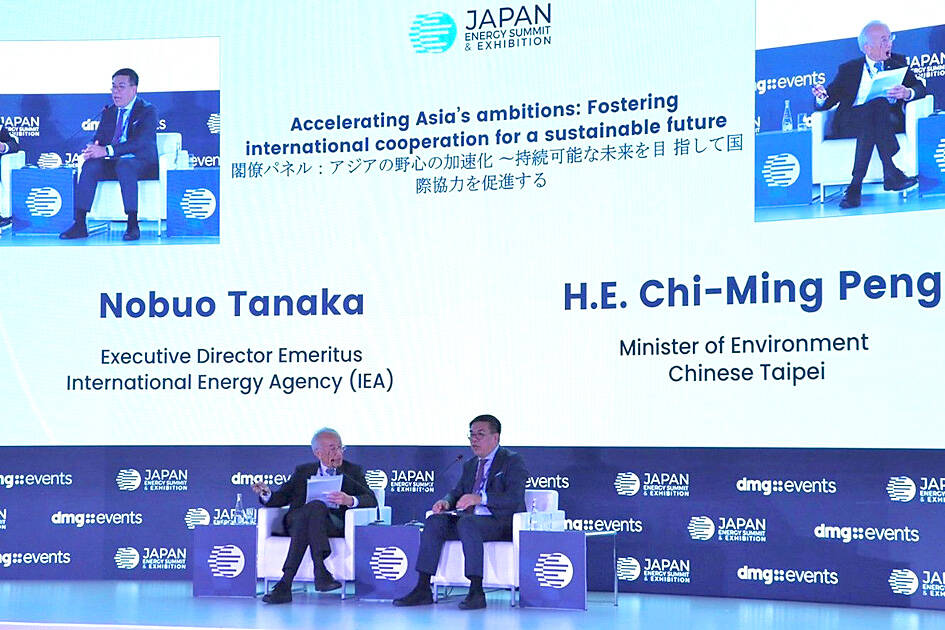Minister of Environment Peng Chi-ming (彭啟明) on Wednesday updated international energy and climate leaders on Taiwan’s latest climate and carbon reduction policies during the Japan Energy Summit in Tokyo.
Taiwan has set a contribution target of reducing carbon emissions by 36 to 40 percent by 2035, with 2005 as the baseline year, the second-most ambitious target among Asian countries, behind only Japan, Peng said during a panel discussion with International Energy Agency executive director emeritus Nobuo Tanaka.
While the No. 2 reactor at the Ma-anshan Nuclear Power Plant in Pingtung County was decommissioned on May 17, Taiwan has maintained stable power supply while steadily driving the sustainable energy transition, Peng said.

Photo courtesy of the Ministry of Environment
Taiwan would adopt an open yet wary attitude toward emerging energy sources amid the global energy transition, and take a cautious approach to existing energy facilities, he said.
He also cited President William Lai (賴清德) as saying during his presidential inaugural anniversary address on May 20 that Taiwan’s nuclear policy would be cautiously implemented based on “two musts” and “three principles.”
The “two musts” refer to two procedural requirements: the Nuclear Safety Commission must establish legitimate procedures for evaluating the safety of nuclear power plants and Taiwan Power Co must conduct safety inspections in accordance with those procedures to assess the costs and feasibility of restarting a nuclear power plant.
Before nuclear facilities are turned on, they must meet “three principles”: nuclear safety has been ensured, the nuclear waste issue has been resolved and societal consensus has been reached.
Taiwan has entered the era of carbon pricing and would progress toward a dual-track carbon reduction mechanism that combines carbon fees with an emissions trading system, Peng said, adding that it would begin on a trial basis from the second half of next year and run until 2028.
The carbon fee system is based on the characteristics of different industries and implements a scheme of self-determined emissions reduction plans to guide companies in their green transitions, in line with international regulations, he said, calling on Asian countries to initiate collaborations in building a regional carbon reduction market.
Taiwan has been developing multiple net zero techniques, solar power, offshore wind power, geothermal energy, hydrogen, methane pyrolysis, energy storage technology, and carbon capture, utilization and storage, Peng said.
Different energy sources present different opportunities and challenges, he said, adding that he expected to expedite Taiwan’s green energy developments and decarbonization process through exchanges with international partners.
Although carbon tariffs and volatile climate policies pose a challenge to many countries, Taiwan would be consistent with its net zero commitments and continue to adjust its strategies to ensure steady energy transition, Peng said.
Additional reporting by Chen Yu-fu

The Chinese military has built landing bridge ships designed to expand its amphibious options for a potential assault on Taiwan, but their combat effectiveness is limited due to their high vulnerability, a defense expert said in an analysis published on Monday. Shen Ming-shih (沈明室), a research fellow at the Institute for National Defense and Security Research, said that the deployment of such vessels as part of the Chinese People’s Liberation Army (PLA) Navy’s East Sea Fleet signals a strong focus on Taiwan. However, the ships are highly vulnerable to precision strikes, which means they could be destroyed before they achieve their intended

The Taiwan Experience Education Program (TEEP) has funded short-term internships in Taiwan for more than 4,500 young people from more than 40 countries since 2015, with the goal of attracting and retaining international talent, the Ministry of Education said yesterday. Fifty-five colleges launched 514 projects this year, including in fields such as semiconductors, artificial intelligence, medicine and biotechnology, green energy, and sustainability, it said. The program provides research and practical internships in Taiwan for two to six months, and offers cultural exchange and networking opportunities, the ministry said. For example, National Formosa University’s Embedded System and Autopilot Laboratory developed two solar-powered drones in

GLOBAL: Although Matsu has limited capacity for large numbers of domestic tourists, it would be a great high-end destination for international travelers, an official said Lienchiang County’s (Matsu) unique landscape and Cold War history give it great potential to be marketed as a destination for international travelers, Tourism Administration Director General Chen Yu-hsiu (陳玉秀) said at the weekend. Tourism officials traveled to the outlying island for the Matsu Biennial, an art festival that started on Friday to celebrate Matsu’s culture, history and landscape. Travelers to Matsu, which lies about 190km northwest of Taipei, must fly or take the state-run New Taima passenger ship. However, flights are often canceled during fog season from April to June. Chen spoke about her vision to promote Matsu as a tourist attraction in

Taipei resident Mu Chu-hua caught some glimpses of China’s mighty military parade on YouTube on Wednesday. As she watched hypersonic missiles roll down Beijing’s Changan Avenue and troops march in lockstep, she did not feel like they posed a threat to Taiwan. Mu, a 69-year-old retiree, said she saw the parade as simply a way for Chinese President Xi Jinping (習近平) to “say thank you to the troops.” “I thought it was quite normal,” she said. “It was very cool.” China’s military parade commemorating the end of World War II was being watched internationally for insights into Beijing’s military advances and its show